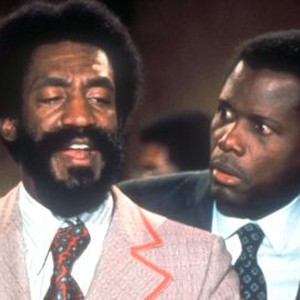
He followed that with A Warm December (1973), romance in which the villain is the black-specific disease sickle cell anemia. His first project, 1971's Buck and the Preacher, bore a weighty dedication to "those (blacks) whose graves are as unmarked as their places in history:" The film itself was a lightweight comedy-western.
Poitier's subsequent emergence as a director does little to quiet those old suspicions. It is possible that Poitier was little more than fortune's choice, a working black actor at a moment in history when Hollywood desperately needed a living symbol of its New Frontier spirit? Still, it is difficult not to harbour a few nagging doubts about his true ability. His name is synonymous with sincerity and good citizenship.

Poitier, director and star of the current Uptown Saturday Night, is the archetypal "credit to his race." The first black to win a Best Actor Oscar (in 1963 for Lilies of the Field), he is not so much an individual as an institution. The more open and progressive the movie business becomes, though, the more appropriate that unknown Spanish translator's description becomes. In stilted English, it explained that one of the scheduled features starred "the distinguished American actor of colour, Sidney Poitier.”Īt the time that seemed like a strange, strained turn of phrase. General entertainment.Ī FEW YEARS AGO, a press release announced the program for a reasonably important film festival in Spain. The five films being added today to the Reeling Back archive (with links to each following the Afterword to this posting) include director Sidney Poitier’s 1974 after-hours frolic with his buddy Bill, the all-star African-American comedy showcase Uptown Saturday Night And, of course, he was a movie star, often working with his friend Sidney Poitier. A prominent advocate for education, he held about 70 honorary degrees prior to his fall from grace. He became beloved for his work promoting family values on The Cosby Show (1984-92), where he played Cliff Huxtable, rated “greatest TV dad” in a TV Guide poll. As the first African-American to co-star on a prime-time TV series - opposite Robert Culp in 1965’s I Spy - he brought about change.

Forever in its shadow will be our "before" picture of Cosby, the successful stand-up comic, actor, author and positive inspiration to black youth. The "after" image is a mug shot, representing the fact that he is currently serving a prison sentence of up to ten years for “aggravated indecent assault.” His 2018 conviction, called a watershed moment for the #MeToo movement, represents justice for one among some 60 women who came forth to accuse the entertainer of sexual abuse.

History’s file on Bill Cosby, born on this day (July 12) in 1937, contains before and after photos.


 0 kommentar(er)
0 kommentar(er)
